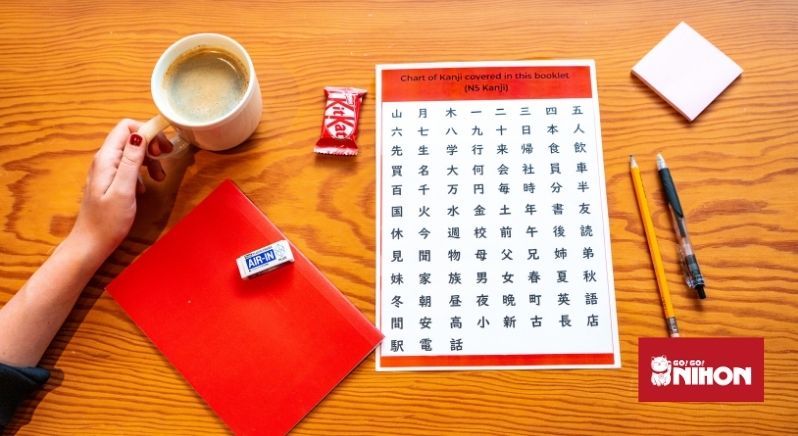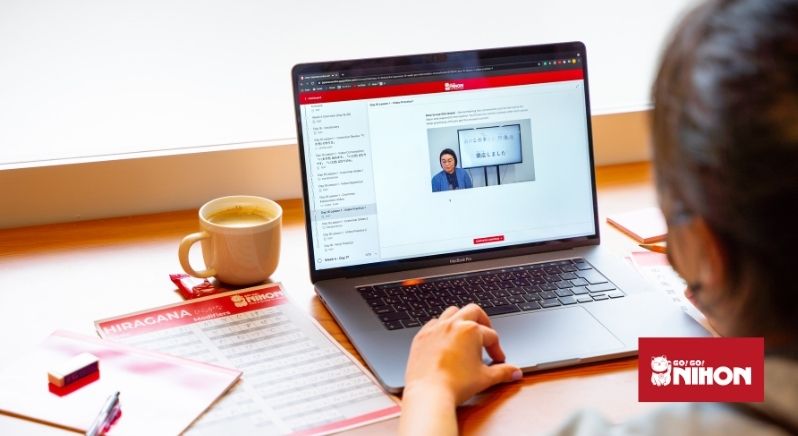We spoke with three students who completed our 12-week online beginner Japanese language course about their experiences taking the course – Antares from Mexico, Guillaume from France and Tanner from the United States.
Learn about how much their Japanese progressed, how they found the course, and their tips for time-management while studying an online language course.
Note that responses have been edited for clarity and brevity.
What was your Japanese level prior to starting the course?
Antares: Almost none. All I knew was from watching anime and YouTube videos.
Guillaume: Almost beginner. I already knew hiragana, katakana and some vocabulary through reading manga or watching anime in Japanese.
Tanner: Prior to starting the course, I had completed a beginner Japanese language course through my Community College. While I learned a lot through there and genuinely enjoyed learning the language, a lack of practice following my studies made this course that I took over two years ago nearly obsolete when it came to my current Japanese skill level.

What did you enjoy the most about the online beginner Japanese language course?
Antares: That I could go at my own pace and it was, in a way, personal.
Guillaume: The way lessons are made is very interesting and they explain things perfectly so we understand it much faster.
Tanner: It gave me Japanese knowledge that felt instantly usable. What I had been learning through the course was not just the basics of the language and the tools necessary for forming sentences, but it gave me the tools that were easy to apply for my life in America while I wait to go to Japan.
What did you find the most challenging?
Antares: Since there weren’t any “repercussions” I would sometimes forget about the course and let it sit there for days. So I had to really focus on my studies and establish schedules. Other than that, it’s a pretty straightforward and easy course.
Guillaume: Memorising a lot of vocabulary in a short time. The kanji are also really hard to memorise, but it makes the learning more fun and more challenging.
Tanner: The most challenging aspect of the course for me was applying what I was learning in my daily life – it was one of my favourite parts about it though! I have the amazing opportunity to be close to so many Japanese restaurants and businesses where I live where I am able to practise my language skills.
How did you manage your time while taking the course?
Antares:I had a part-time job, so sometimes I would forget about my classes because I was either tired or I just didn’t feel like taking the classes that day. However, the course did help me to distract myself from my daily routine, so I tried to take them every afternoon, at least for 30 min daily.
Guillaume: When I started the online beginner Japanese language course, it was my priority every day. I spent around two hours in the morning doing the daily lessons. In the afternoon, I was doing homework and reading the lessons again. During the whole period, I maybe had two or three weeks of holidays. But when I had free time, I was reading the lessons.
Outside of class, I bought exercise books to train myself a little bit more than the course. I also bought a kanji exercise book and a kanji dictionary that I still use even after I finished the course.
Tanner: I had an easy time managing my ability to still work full-time and have a social life while still completing all of the lessons. I created my own “school schedule”, giving myself five days to completely dedicate to the online course and two days reviewing what I learnt.
Outside of the time I spent taking the course, I made it one of my biggest goals to spend at least an hour every day going over what I had learned. I spent some time reviewing my notes over dinner or quizzing myself on sentence structure with some music playing in the background. Most importantly, I studied flash-cards of the new vocabulary I had the most difficulty with before bed.
How much do you think your Japanese language abilities improved by the end of the course?
Antares: I think my language skills improved. However, personally I could’ve dedicated more time and effort to my studies so that I could be at a higher level than I am today.
Guillaume: I really improved my skills by the end of the course and I am probably able to go to Japan and to be understood for basic things. Maybe my speaking is not fluid at all but the more vocabulary I know, the more I can say or ask things.
Tanner: My Japanese improved immensely through this course. One of my biggest fears when completing the application process for language school in Japan was where to start when it came to re-learning even just the beginner Japanese I once had. Twelve weeks is by no means enough to become fluent in Japanese, but I have more confidence in learning Japanese going forward.

What are you doing in terms of your language studies now that you have finished with the course?
Antares: I try to practise everyday with YouTube videos, I follow TikTok accounts that remind me of vocabulary every day and I follow Japanese influencers just so that I don’t forget what I already know. I am currently looking into going to Osaka to pursue my Japanese language studies so that I can build my future in Japan.
Guillaume: After I finished my course, I kept studying Japanese on my own because I am still a beginner and I need to work every day to get better. In the future, I hope I will know more about Japanese culture and make friends from there. My goal is to learn Japanese writing in order to write my manga and, if possible, learn some drawing skills while I am in Japan.
Tanner: After finishing the course, I’ve focused most of my studies on learning more kanji from a workbook I purchased online. I also try to take a few kanji from whatever manga I am reading or translating from Japanese to English.
I also took the Go! Go! Nihon Japanese Crash Course. I was particularly attracted to this course because it covered beginner Japanese, but also because of its focus on Japanese culture. I really enjoyed the lesson that discussed the history of Japanese alcohol where it ended with touring a sake brewery. I highly recommend that course as well as it was not only a good crash course, but it was also super interesting and I learned far more about Japanese culture and traditions than I thought I would.
What are your top tips for learning online?
Antares: Right now, it is a difficult time for all of us and we are all searching for something to distract ourselves – learning a new language is great! My tips would be: do it at your own pace, and when you think it’s best for you. Do not pressure yourself too much. You’re supposed to enjoy learning a language, not suffer because of it.
Find a schedule that is right for you and work with that. It could be in the morning or in the afternoon. If you are a busy person, dedicate at least 30 minutes every day to it. Consistency is key. Repeat to yourself the vocabulary. When you feel overwhelmed, take a break. Keep your notes simple. You don’t have to write everything, unless that works for you.
Finally, the tip that worked best for me is, consume Japanese entertainment as much as you can. Watch anime, reality TV, YouTube vloggers and listen to Japanese music. If you programme your brain to listen to the language, even in your freetime, learning the language will be really easy.
Guillaume: Learning a language is something that takes time and it needs to be done every day, even during a short time. Learning online is great, but nobody is behind you telling you to keep working so you need to be motivated. Find a goal to reach and work outside of the course – not just the homework but also reading, doing exercises, watching or listening to some Japanese.
Learning Japanese is really interesting so you should not force yourself to learn it but enjoy doing it.
Tanner: I highly recommend tips like managing your time with a schedule, eliminating distractions from where you study, etc. But my biggest piece of advice for taking this course and studying Japanese in general is to keep it fun. Learning Japanese is really enjoyable, but studying anything in a classroom or online class format can become difficult. I think it is essential to continue having fun with Japanese and finding fun ways to continue learning and applying what’s already been learned outside of online coursework.
One of my new favourite hobbies is to read manga in Japanese and translate it into English. Not only is this entertaining, I tend to absorb a lot of what it is that I learn. This means that I’m not only keeping myself entertained, I’m technically studying too! Learning a new language should never be boring, but it does rest in the hands of whoever is learning to make it as entertaining as possible.
Learn more about the 12-week online beginner Japanese language course here. If you’re unsure about your language level, take our level test here.













